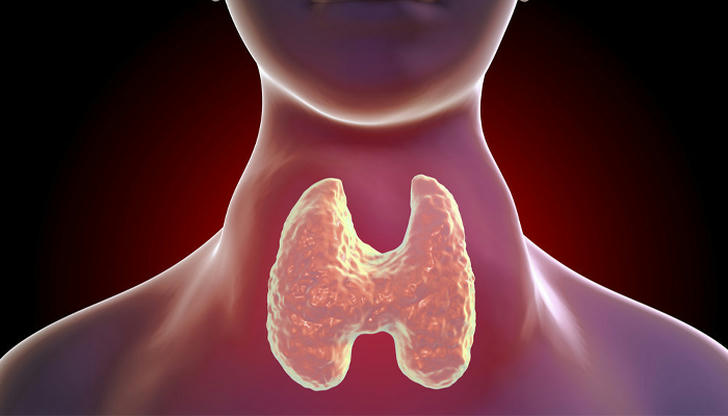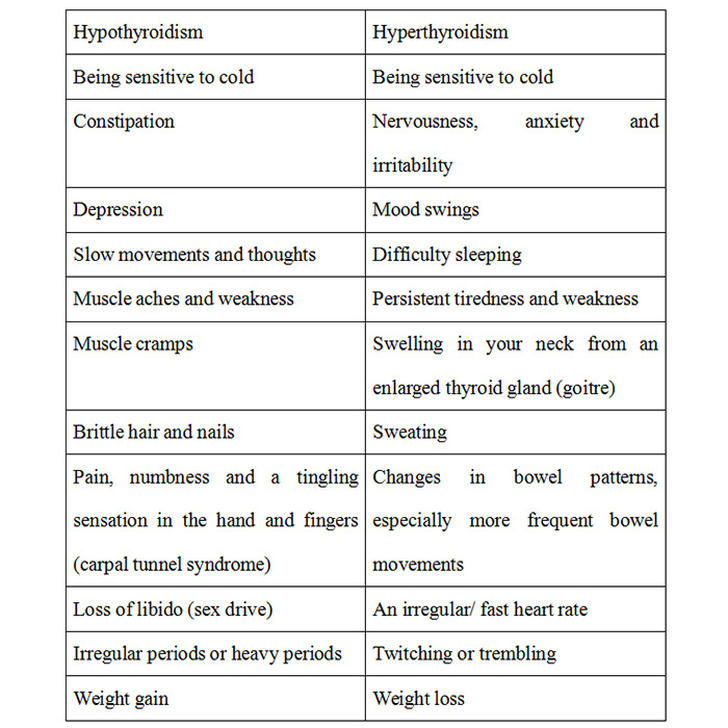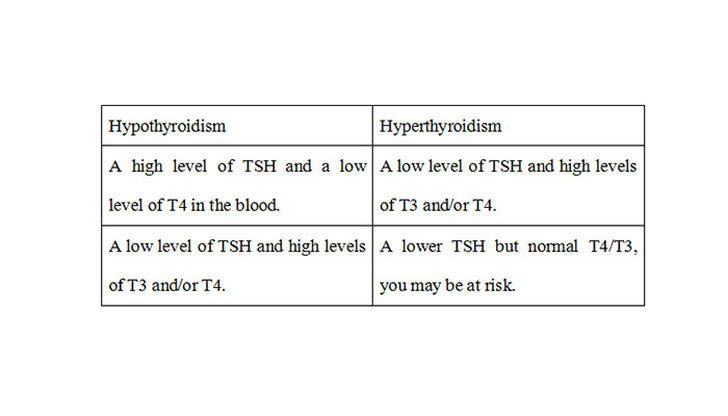Facts about Thyroid Problems & Disease

Hypothyroidism and Hyperthyroidism are common conditions where the thyroid doesn't create and release right thyroid hormone into your bloodstream. Hypothyroidism does not produce enough hormones, making your metabolism slow down. However, Hyperthyroidism produces too much of the hormone thyroxine, accelerating your body's metabolism. They really belong to a thyroid disease but in two completely contrary aspects.
Meet Thyroid

What is that? The thyroid is a small butterfly-shaped gland in the neck, just in front of the windpipe (trachea). It produces hormones that affect things such as your heart rate and body temperature.
One of its main functions is to produce hormones. They are called triiodothyronine (T3) and thyroxine (T4) that help regulate the body's metabolism (the process that turns food into energy). Having too much or too little of these hormones both can cause unpleasant and potentially serious problems that may need treatment.
There isn’t a fundamental solution of preventing an underactive or overactive thyroid until now.
Possible Triggers

Most cases are caused either by the immune system attacking the thyroid gland and damaging it, or by damage to the thyroid that occurs during some treatments for an overactive thyroid or thyroid cancer.
Symptoms

Many symptoms of both thyroid disease are the same as those of other conditions, so it can easily be confused for something else. You may not realize you have a medical problem for several years because of these symptoms usually develop very slowly.
Common symptoms include:

Those symptoms listed in the table are relative obvious,but not included all. Different people may have other special symptoms.
Common Effects

Elderly people with a thyroid disease may develop memory problems and depression. Children may experience slower growth and development. Teenagers may start puberty earlier than normal.
If you have any of these symptoms, see a doctor as soon as possible. It may not threaten your life, but it surely worsens your health, your lifestyle, your mood step by step.
These two types are about 10 times more common in women than men, and typically happens between 20 and 40 years of age.
Thyroid Function Test

A blood test is a very important and accurate way to measure your hormone levels, so as to diagnose whether there's a problem with thyroid. We need to know some proprietary medical vocabulary when we learn about it.
The Levels of Test Checks:

TSH- thyroid-stimulating hormone – a hormone produced by the pituitary gland (a gland at the base of the brain) which controls the production of thyroid hormones
T3(FT3)-triiodothyronine – one of the main thyroid hormones
T4(FT4)-thyroxine – another of the main thyroid hormones
Different data will be diagnosed whether you eventually develop a thyroid disease.

Further Blood Testing

ESR Blood Test: It is a further blood testing, when your thyroid hormone levels are abnormal, you may be referred to a specialist for further tests to find out what's causing it. This blood test called erythrocyte sedimentation rate (ESR) may also be done to check for inflammation in your body.
Another blood testing also can try to find anti-thyroid antibodies which is a common cause of thyroid disease called Graves' disease. Both blood testing can help you confirm whether you have such thyroid disease or which type of thyroid disease.
Sometimes, the thyroid scan needed to check how much of the substance has been absorbed and to examine the size and shape of your thyroid.
Complications

Sometimes, treatment for an overactive thyroid often results in hormone levels becoming too low which will cause an underactive thyroid. Any of these two types are bad for our health.
Treatment for an overactive thyroid often results in hormone levels becoming too low. This is known as an underactive thyroid (hypothyroidism).
Hypothyroidism may lead to

Heart problems-hormone thyroxine can lead to increased levels of cholesterol in your blood. High cholesterol can cause fatty deposits to build up in your arteries, restricting the flow of blood.
Goitre-A goitre is an abnormal swelling of the thyroid gland that causes a lump to form in the throat.
Myxoedema coma-a severe underactive thyroid may lead to a life-threatening condition.
Hyperthyroidism may lead to:

Eye problems: eyes feeling dry and gritty sensitivity to light, watering eyes ,etc.
Thyroid storm: a rapid heartbeat a high temperature diarrhoea and being sick yellowing of the skin and eyes (jaundice) severe agitation and confusion loss of consciousness.
Others: Atrial fibrillation,weakened bones (osteoporosis), heart failure,even death.
Both Hypothyroidism and Hyperthyroidism not timely treated during pregnancy, they're a lot of risks of pregnancy complications occurring. So if you're not planning a pregnancy, it's important to use contraception because some treatments for an overactive thyroid can harm an unborn baby.

